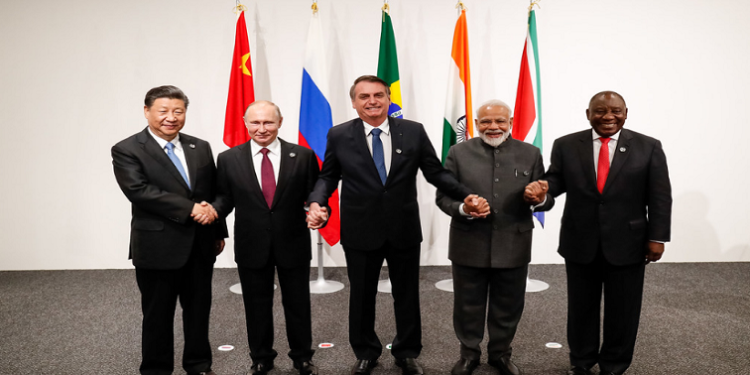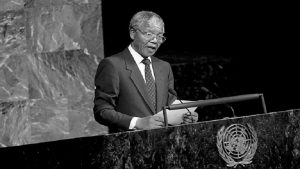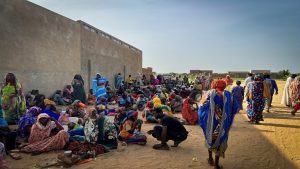In a recent BRICS meeting comprising foreign affairs/international relations ministers, a plethora of telling resolutions were adopted by the top diplomats representing each of the five member-states in the form of Brazil, Russia, India, China, and South Africa.
BRICS member-states, meeting under the Chairship of China, held their scheduled deliberations under the theme: “Strengthen BRICS Solidarity and Cooperation, Respond to New Features and Challenges in International Situation.”
Although the members of BRICS are known for their significant influence on regional affairs, the five major emerging economies have noticeably been rather lukewarm as a bloc in international relations.
Hence the call to “strengthen solidarity and cooperation” and also facing global challenges and concerns as a collective rather than individuals.
At the very inception of BRICS in 2001, and markedly in 2010 when South Africa was added as the last member, it was envisaged that the five member-states will develop to collectively dominate global growth by 2050. Their potential to do so remains alive.
China’s economy is currently the second largest in the world – second only to the US, and Beijing has grown to represent a must go-to global force in economic development and world politics.
Another BRICS key member, Russia, continues to demonstrate great resilience in the wake of punitive Western sanctions over the Ukraine conflict. A major gas and oil exporter, Moscow has succeeded in forcing particularly Western countries to buy its oil and gas strictly in the local currency, the rubble – or leave. This has resulted in the EU tweaking its rigid anti-Russia stance, permitting countries to meantime purchase Russian goods and services in accordance with the dictates and demands of the Kremlin.
One of the interesting resolutions was the revelation that BRICS member-states have decided to expand the organisation. This is in the view of increasing its global influence.
Resolution 24 states: “The Ministers supported promoting discussions among BRICS members on BRICS expansion process. They stressed the need to clarify the guiding principles, the standards, criteria, and procedures for this expansion process.”
Clearly, the agreement has been reached and what is left is ironing out the modalities. This is great news indeed for BRICS. Although the body possesses a huge potential to impact the course of world politics, its minute size and geographical make-up have often created a spot of bother.
It is a wide decision to identify countries that could add value to BRICS as a vehicle for influencing global relations through its agenda-setting nature and unique make-up.
The BRICS foreign ministers further bound their respective countries to the resolution extending cooperation “to other developing countries and emerging markets”. They also supported “further promoting BRICS Outreach and BRICS Plus Cooperation, in line with the updated Terms of Reference adopted by the BRICS Sherpas in 2021 through inclusive and equal-footed and flexible practices and initiatives”.
This shows that since the advent of COVID-19, BRICS members have not been resting on their laurels. Hard-work has been taking place behind the scenes and the need to reposition and even to repurpose BRICS is greater.
At the level of the UN General Assembly and indeed in the UN Security Council, it has recently become abundantly clear that the world order in the latter part of the 21st century is gradually becoming unipolar.
The chasm between the well-off Global North and the hustling Global South continues to expose the immoral inequities that invariably condemn the poor to a permanent state of want and their wealthy counterparts to growing arrogance laced with debilitating ignorance.
It is therefore worth noting the BRICS resolution 20, where the ministers agreed “to strengthen cooperation on issues of common interests both within BRICS and in multilateral for a including the UN General Assembly and Human Rights Council”. The resolution continues: “Taking into account the necessity to promote, protect and fulfil in a non-selective, non-politicised and constructive manner and without double-standards.”
Throughout 2022, during China’s Chairship of BRICS, the theme guiding all deliberations is as follows: “Foster High-Quality BRICS Partnership, Usher in a New Era for Global Development.”
This stance by BRICS is crucial for a number of factors, among others – the global development has evidently been discriminate in form and nature. It has benefitted countries in the Global North at the expense the impoverished nations of the Global South. BRICS members correctly identifies the need to “usher in a new era for global development”, where hunger, starvation, and impoverishment would no longer be the exclusive preserve of some and not for others.
This is in line with the BRICS mechanism and founding ethos that are based on promoting peace, security, development, and cooperation. BRICS founding preamble also seeks to contribute significantly “to the development of humanity and establishing a more equitable and fair world”.
There were compelling factors at the inception of BRICS in 2001 as to why the organisation concerned itself with a need to bring-about a just world order.
For far too long, inequality emanating out of selfish nature and attitude of the haves towards the have-nots has created antagonism and disharmony on a grand scale.
Lately, the powerful nations of West no longer use the UN as a first reference point of the international law. Instead, they have carved for themselves a notion of the so-called “rules-based world order”. Mind you, their rules, which they unashamedly forces down the throats of everyone. They do this by waving threats of economic sanctions and military power to achieve their nefarious objectives.
The relegation of the UN to the secondary role in endeavours to resolve the Ukraine conflict is evidence that the powerful nations in organisations such as NATO and the EU have become the determinant factors in international relations.
To be caught on their wrong site warrants severe condemnation and punishment, as evidenced by the plight of the people of Palestine, Yemen, Syria, Libya, Iran, the plundering of the DRC, unending conflict in many parts of Africa with the evident hand of the West – the list is endless.
BRICS need no longer be a body that represent the five emerging powerful economies. It needs to be repositioned to become home for the weary and thirsty nations seeking justice in a world dominated by hyenas and scavenging nations pretending to be good Samaritans.






